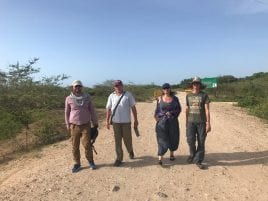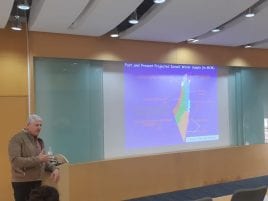
Colombia is a country rich in biodiversity, with extremely varying geographic and climatic scenarios which include among others the Amazon rainforest, the Andes, the Western Plains, and the arid desert located in the North of the country. In addition to its social and political complexities, the environmental challenges faced by the country are significant.
The Javeriana University in Bogota recently launched the Javeriana Water Institute (IJA), which focuses on critical water related issues in the region. The Arava Institute team was invited to the Institute’s opening in Bogota, and to a field visit to the Guajira department in the North, where the local native population faces an ongoing drought crisis, riddled with economic, social, political, cultural, and environmental challenges.

The trip was deemed highly successful. A warm friendship was established, as well as a strong will to work together, and opportunities were identified. The Institute is looking forward to participating in the development of a pilot project in the Guajira peninsula, as a first step, to be led by the IJA in 2020 in one of the local communities.

